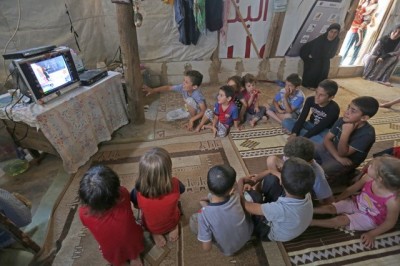
A casual glance at the news headlines suggests the Middle East is beyond saving — seemingly locked in a perpetual cycle of war and bitter rage.
It’s a lost cause, some might feel.
But is it really?
The people of the Middle East aren’t a “lost cause.” They’re lost sheep — crying out for a divine shepherd to lead and comfort them.
In Iraq and Iran, there’s reportedly a surge in atheism. But it’s largely a reaction against religious authoritarianism. The people are sick of dictators wielding religion as a weapon, as a tool to power. They just don’t see a God of love in their religious system.
Who will make God’s love visible to them?
For years, I’ve been immersed in the cultural, religious and political atmosphere of the Middle East. As president of SAT-7 USA, the American arm of SAT-7 International located in the region, I’ve had a front-row seat to the turmoil in the Middle East — and yet also seen movements of the Gospel that were unimaginable just a few years ago.
Back in 2009 when I joined the organization, social media was still in its infancy, Snapchat and Instagram didn’t exist, smartphones were a novelty, and Blu-ray was “the thing.”
Since then, we’ve experienced the social and digital media revolution — including apps, video-on-demand, and high-definition television. Anyone, anywhere in the Middle East can now watch Christian programs in their local language at home — or on their phone as they stroll down the street.
For the first time, God’s love really is visible to the entire Middle East.
Satellite television still has a huge impact in the region, especially among those who can’t read or write. The poorest families own a television set. Nomadic tribespeople have satellite dishes next to their tents and camels. And even families living in refugee camps huddle around a TV set.
In parts of the region that are hostile to Christianity — and that’s most places — live satellite broadcasts can’t be censored. Programs might get knocked off the air for a few hours, but they’re soon back on, and even that rarely happens. Broadcasts can reach homes in Mecca and Tehran, no matter what a regime, ruler, or religion says or does. They can’t possibly tear down every satellite dish.
For God, there’s no such thing as a closed country or — for that matter — a closed heart. And he supplies courage for every heart at the moment of need.
One 19-year-old viewer faced furious authorities who demanded she recant her faith in Christ. “I have no idea where the courage came from, but I was not afraid and I was able to answer all their charges,” she said. “They released me — and, 30 minutes later, I was shaking like a leaf.”
Another teenager began following Christ through the ministry of our Arabic-language channel. Her entire family disowned her. But they couldn’t resist the love that she showed them in return. In time, her mother and sister asked to meet “this Jesus” — and her father’s heart melted, too.
Do these stories sound like a “lost cause” to you?
Has God given up on the Iranians? The Palestinians? The hurting peoples of the Middle East and North Africa?
Absolutely not!
They are the “lost sheep” whom he’s gently calling, leading them to an eternal place free of sin, suffering, pain, and death.
As Revelation 7:9 says: “… and behold, a great multitude, which no man could number, out of every nation and of all tribes and peoples and tongues, standing before the throne and before the Lamb, arrayed in white robes…” (ASV).
Dr. Rex M. Rogers is president of SAT-7 USA, a Christian media ministry that broadcasts across the Middle East and North Africa in local languages. He is retiring at the end of May, 2025.


















